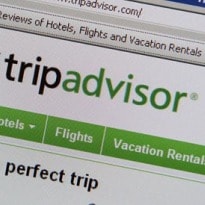From fake venues to spats over the accuracy of reviews, disputes between TripAdvisor and restaurants keep on coming. But how do you use the site's reviews? And do you trust them?
Barely a week goes by without the restaurant industry and TripAdvisor [TA] falling out. Last week, it was reported that mischievous web-users had propelled a fictitious venue to a top ranking in Brixham, reports followed this week about how it was all a ruse to prove you can game the system, while, despite vociferous objections from its owner, a Yorkshire restaurant had numerous positive reviews removed, after TA's filters judged them suspicious. Claims and counter claims swirl around such stories, most generating more heat than light.
Clearly any review site on which a Glasgow homeless shelter can emerge as one of the city's top hotels isn't fail-safe, but did anyone think TA was? Doesn't everybody approach it with caution? Not because of headline-grabbing, malicious fake reviews, but for a far more mundane reason: a significant minority of its users don't know what they're talking about. Blimey, there are people on TA who I wouldn't trust to pass me a pair of scissors, never mind recommend a restaurant I should eat in. But you knew that, right?
To use TripeAdvisor - as it's hilariously and somewhat unfairly known in our house - properly, you need to read it. You can't just look at the scores. And to read it in a way that is rewarding, you need to develop a set of personal idiot filters, far more powerful than anything TA could develop to police the site. For instance, if I'm looking for a hotel, I am wary of fellow travellers (usually, wealthy Americans) who are used to such obliging levels of service, that they've given perfectly good hotels 1/5 because the front desk refused to send someone up from reception to wipe their bum for them.
Likewise, there are a remarkable number of people reviewing restaurants on TripAdvisor, who don't care about food. Like me, you've no doubt read posts (or clusters of posts, appearing almost simultaneously, from different members of the same irate party) that fulminate with invective - header: "I will NEVER go back" - because the waiter's welcome wasn't warm enough; the chairs were a bit uncomfortable; the lighting was dim; someone had to wait 17 seconds for their main course; there was a mistake with the bill; the kitchen refused to rustle-up chicken nuggets and chips for a child; they were out of soap in the ladies' toilet; the staff forget to put the balloons out for Uncle Peter's birthday. Yet, many of these posts still conclude with: "We all agreed that this was some of the best food we had ever eaten, and it's incredible value, too."
Do you take any notice of such reviews? Well, it depends what you care about, doesn't it? Eating well or the fact that the service was a bit slack. Even then you've got to allow for the exaggeration and OTT self-justification that is the hallmark of any critical review. Put simply: you cannot use TripAdvisor without sifting its reviews according to how rational, intelligent, experienced and fair-minded a reviewer seems ... or not.
Should I even be talking about this? There is something of an omerta around TripAdvisor among paid food journalists. We all know it's there, we can't help but use it. But we remain sceptical about this rough'n'ready litmus test of local opinion. Ideally, we prefer to pretend that it doesn't exert any influence on us. Our own high priestess of the pass, Marina O'Loughlin, summed-up this ambivalence in a recent review, when she admitted to browsing that "chatroom for shills" to try to make sense of her opinion of The French restaurant in Manchester.
Me? I'm happy to go one better and admit that in researching my "budget eats" series for the Guardian, I find TA invaluable. As one of several research tools (local contacts, trawling guides, blogs and so on). it regularly points me towards excellent cafes and restaurants that I would otherwise have missed. TA is very quick, it's very democratic and so, particularly at that sub-£10 price-point, it's useful. Of course, places crop up in any town's top 20 that are there because said venue does an enormous carvery/it's Nando's/the chef spends more time drumming up online support than cooking, but to ignore TripAdvisor would be peculiarly arrogant, and self-defeating.
What do you think of TripAdvisor? Do you use it? Do you post reviews on it? And how reliable do you find its restaurant rankings?
TripAdvisor: best read using your own set of idiot filters. Photograph: Alamy









